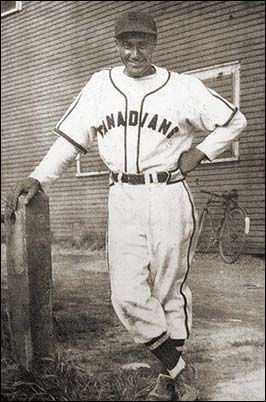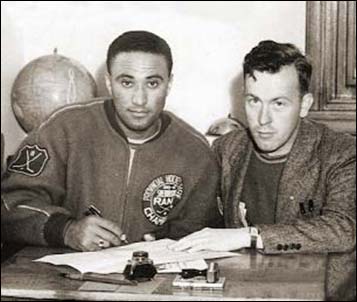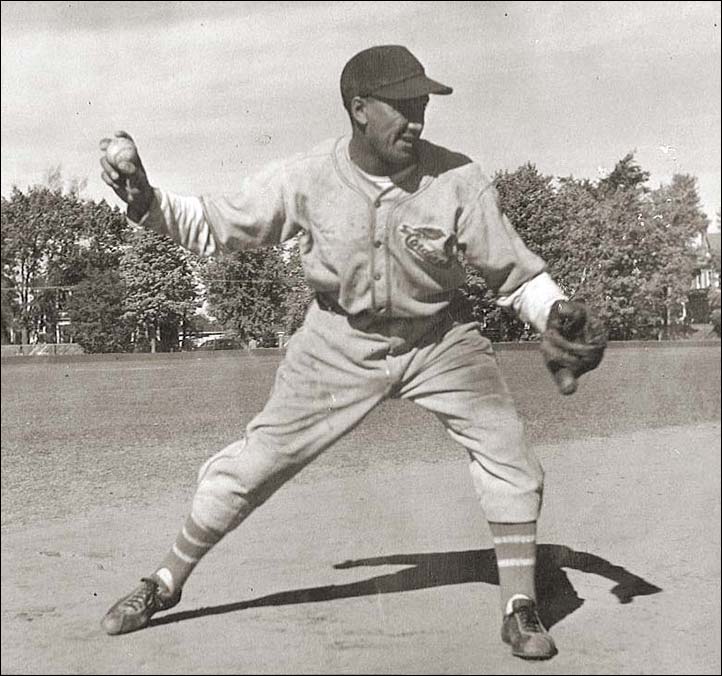
Vincent Churchill "Manny" McIntyre
Born : Gagetown, New Brunswick, October 4, 1918
Died : Candiac, Quebec, June 13, 2011
6', 195 lbs. Baseball - Shortstop. Hockey - Left Wing.
Better known for his prowess in hockey, McIntyre carved out an historic breakthrough on the diamond. He was just weeks behind the legendary Jackie Robinson who broke the colour barrier in pro baseball in the spring of 1946.
After starting the 1946 baseball season with the Middleton Cardinals of the Halifax and District League the Sherbrooke entry in the new Class "C" Border League came calling.
He signed a contract with the Sherbrooke Canadians on May 30th and on June 1st, 1946, took his position at shortstop at Sherbrooke's Stade du Parc to become the first Canadian-born black man in the modern history of Organized Baseball to participate in a regularly scheduled game. (William Hipple "Hippo" Galloway of Woodstock, Ontario, was banned from the game in 1899 after playing for the Woodstock Bains in the Class D Canadian League and was the last black man in the pro game in Canada until Robinson's appearance in 1946. Lefty hurler Jimmy Claxton, born in Wellington, BC, was the last black Canadian player in "organized ball" suiting up in 1916 for Oakland in the Pacifc Coast League, He had said he was a Native American.)
 The announcement in The Sporting News (June 12, 1946) seemed remarkably subdued :
The announcement in The Sporting News (June 12, 1946) seemed remarkably subdued :
The Sherbrooke Canadians signed Manny McIntyre, 26-year-old Negro from Fredericton, N.B., and purchased First Baseman Dick Washburn from Auburn.
Right - McIntyre signing with Sherbrooke. That's team owner W.J. Burns looking on.
Colin D. Howell, in his book, Northern Sandlots: A Social History of Maritime Baseball, made note of McIntyre's high profile in the Maritimes.
Of all the black players in the Maritimes during the thirties, none was any better than Vincent "Manny" McIntyre. A native of Fredericton, New Brunswick, Manny McIntyre began his baseball career with the Devon, NB, junior team in 1938 and was quickly recognized as one of the finest all-around ballplayers in the region. A superb athlete, McIntyre was equally at home on the ball diamond or hockey rink, playing professional hockey in Quebec, Ontario and the Maritimes. When organized baseball dropped its colour bar with the signing of Jackie Robinson, McIntyre, who had been courted by several Negro League teams in the United States, was one of but six players signed by professional teams for the 1946 season. Suiting up with Sherbrooke of the Class C Border League that June, he hit .310 in thirty games but suffered in the field and returned to the Maritimes to play ... In 1949 McIntyre teamed with another black Maritimer, Charlie Pyle, to lead Fredericton Capitals to the New Brunswick championship over the Moncton Legionnaires.
[Above photos from Quebec Heritage News, Vol. 6 No. 3, Fall 2011]
McIntyre's athletic achievements were highly noticeable even in his high school years in Fredericton in the late 1930s when he led his school to the Maritime baseball championship and suited up with the Fredericton Capitals of the New Brunswick Senior League and then in hockey where he was in the lineup for the Fredericton Capitals as they romped to the Southern and Eastern championships in the Maritimes in the winter of 1938-1939.
On the diamond in 1939 he moved on to the Devon Tigers and then the Truro Bearcats. He also performed on the ice with Truro before being enticed to Northern Ontario to work in a goldmine in Timmins and join Herb and Ossie Carnegie in what would blossom into a forward line which drew fans and headlines wherever they played.
[Below - the Black Aces, 1948-1949 with Sherbrooke Saints. Herb Carnegie at centre with Ossie on the right wing and Manny McIntyre on the left wing. Toronto Star photo.]
Old time sports fans might remember Manny as a hockey player and teammate of the Carnegie brothers, Herb and Ossie, also black. The three usually played on a line together, often giving themselves colourful names such as Dark Destroyers or Black Aces or Les Noirs to underscore their African roots. Exciting to watch, they packed arenas wherever they went.
McIntyre encountered the Carnegie brothers in Timmins, Ontario, where they all worked the local goldmines and played hockey for the Buffalo Ankerite Bisons. (Bill Young, QUEBEC AND THE INTEGRATION OF BASEBALL, Part Two, Manny McIntyre and the Great Experiment's other forgotten men, Quebec Heritage News, Fall, 2011)
McIntyre had been recruited to the tough work in the goldmines by a old friend from his home town. Manny and the Carnegies were not only expected to be hockey stars (they helped the company's Ankerite Bisons into the Allan Cup playoffs) but to do regular eight-hour shifts in the mine. His stint in Timmins was cut short by military duty with the Canadian Army back in Nova Scotia. While being treated by Army doctors for a severe sinus infection, the medics discovered he was missing the first joints of the third and fourth fingers on his left hand. McIntyre explained they had been amputated the previous year following an accident at the mine and he was given a medical discharge. In short order he turned in his Army duds for a baseball jersey. He had an outstanding 1943 season with the Halifax Shipyards batting .385 during the regular season and upping his game in the playoffs when he hit .448. 1944 was even better, including an MVP (Most Valualbe Player) and MPP (Most Popular Player) awards.
He was named an All-Star on the Halifax club that won the 1944 Halifax Defence Baseball League championship. In 1944 the Black Aces reunited in Shawinigan as members of the Quebec Provincial Hockey League’s (QPHL) Cataracts. Still exotic, still outstanding, their stylish approach kept fans pouring in to their games. McIntyre’s role in the mix, according to Herbie Carnegie, was as “the mucker who battled for the puck in the corners and then placed a perfect pass onto one of our sticks.”
The following summer McIntyre remained behind to play baseball with the Trois-Rivières Commodores of the Independent Quebec Provincial League. Operating outside the structures of Organized Baseball, the league was not bound by any dicta on race or other matters, and consequently McIntyre’s presence on local playing fields was never challenged, especially as he was already known and well liked. In 1945-1946 the hockey- playing trio moved on to the QPHL’s Sherbrooke Randers, named for that city’s Ingersoll Rand Company. With the “Black Aces” leading the charge, the team finished first in regular season play but lost to Victoriaville in the league final.
(Bill Young, QUEBEC AND THE INTEGRATION OF BASEBALL, Part Two, Manny McIntyre and the Great Experiment's other forgotten men, Quebec Heritage News, Fall, 2011)

[Above, McIntyre with the Middleton Cardinals of the Halifax & District League.
Photo from New Brunswick Sports Hall of Fame]
He played well in his historic trailblazing stint with Sherbrooke hitting .310 but an arm injury forced him to the sidelines. He finished out the season with Middleton of the Halifax & District League and according to the New Brunswick Black History Society also had a trial with the New York Cubans of Negro baseball. He is said to have at least played in an exhibition game with the Cubans at Yankee Stadium.
In 1947 he suited up with Sherbrooke and Drummondville (hitting .223 with 19 steals in 77 games) on the diamond while taking his hockey talent to Europe. That winter there were just two of the Black Aces, Manny and Ossie, who joined the semi-professional Racing Club de Paris which sported mainly Canadian players in action against teams from England, Italy, Scotland and Holland. The following season they were back in Quebec, with Sherbrooke, for the last act of the celebrated trio. Manny was back in New Brunswick in the summer of 1949 to help Fredericton Capitals to the league baseball title and that winter put on the pads with the Moncton Hawks of the Maritime Senior League and the next winter it was the St. John Beavers and finally a few seasons in lower level senior and intermediate play.
Accolades did not flow to McIntyre until decades later. In 1995, McIntyre was selected for the City of Fredericton Sports Wall of Fame. In 1997, he was inducted into the New Brunswick Sports Hall of Fame and the New Brunswick Baseball Hall of Fame. In 2000, he was chosen for Oromocto Sports Hall of Fame and in 2011, posthumously inducted into the Canada's Sports Hall of Fame.
[Thanks to fellow baseball researchers Bill Young, Cam Perron & Gary Fink for details on McIntyre's career]
